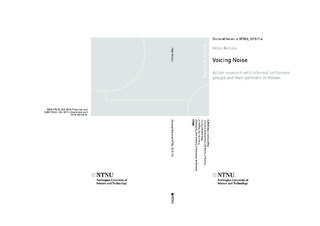| dc.contributor.advisor | Brun, Cathrine | |
| dc.contributor.author | Refstie, Hilde | |
| dc.date.accessioned | 2018-06-06T09:03:37Z | |
| dc.date.available | 2018-06-06T09:03:37Z | |
| dc.date.issued | 2018 | |
| dc.identifier.isbn | 978-82-326-3019-6 | |
| dc.identifier.issn | 1503-8181 | |
| dc.identifier.uri | http://hdl.handle.net/11250/2500546 | |
| dc.description.abstract | Does participatory planning enable informal settlement groups in Malawi to realize citizenship rights such as housing, services and political voice? Is their participation really transformative? These are some of the questions this thesis attempts to answer. It does so by analysing different and overlapping participatory planning spaces and discussing what opportunities and barriers participants face in such spaces.
The thesis shows that informal settlement groups are able to do quite a bit on their own or in collaboration with NGOs and municipal actors. Examples are information gathering, strategic community planning, negotiating for services, pooling of resources, implementation of services such as waste management and security, and building of minor infrastructure. What they were not able to achieve within the current participatory planning frameworks were larger infrastructure such as paved roads, bridges, and access to clinics and schools. The groups were also not able to secure for themselves the same services that were offered in the wealthier areas of the city, achieve complete security of tenure, or build political voice. One conclusion was therefore that the participatory planning processes studied were not transformative. They did in some instances increase the influence of marginalized groups in decision-making, but they did not confront the forces that were causing the social exclusion to begin with.
Global discourses on community mobilizing and participatory planning are largely developed from major cities in India, South Africa and Latin America. In Malawi, limited national and local resources, disconnections from national and urban policies of redistribution, and a local politics shaped by both clientelism and democratic reforms limit the range of strategies and practices available to local groups. In this context, participatory planning tend to promise more than it can deliver. In order to avoid participation fatigue the thesis therefore suggests a framework for mobilizing that takes as its starting point existing capacities and identifies what informal settlement groups can solve with self-organizing, what they can do with better connections and technical advice at the city level, and what requires more systemic political change in terms of resource redistribution and inclusion in the city. Together with clear communication and long-term mobilization, such an approach could prevent transformative participation from deflating before it has begun.
The PhD project was built using an action research approach. This means that the project has been heavily inspired by the priorities of participants and project partners, which were informal settlement groups, the Federation of the Rural and the Urban Poor, the Centre for Community Organization and Development and the latter’s Research Institute in Malawi. The project used an integrated approach that combined pragmatic and critical elements of action research in order to utilize the dynamics between theory and practice in addressing participatory planning issues beyond the immediate community level. The opportunities and dilemmas involved in employing such an approach are discussed both in the foundation and in the articles, and forms an important part of the thesis. | nb_NO |
| dc.language.iso | eng | nb_NO |
| dc.publisher | NTNU | nb_NO |
| dc.relation.ispartofseries | Doctoral theses at NTNU;2018:114 | |
| dc.relation.haspart | Paper 1: Refstie, Hilde; Brun, Cathrine. Voicing noise: Political agency and the trialectics of participation in urban Malawi. Geoforum 2016 ;Volum 74. s. 136-146 https://doi.org/10.1016/j.geoforum.2016.05.012 | nb_NO |
| dc.relation.haspart | Paper 2: Refstie, H. and Millstein, M. Does participatory planning promise too much? Global discourses and the glass ceiling of participatory urban planning in Malawi. | nb_NO |
| dc.relation.haspart | Paper 3: Refstie, H. The Beginning is never the beginning: How to co-produce a space for action research. | nb_NO |
| dc.relation.haspart | Paper 4: Refstie, Hilde. Action research in critical scholarship: Negotiating multiple imperatives. ACME: An International E-Journal for Critical Geographies 2018 ;Volum 17.(1) s. 201-227 (CC BY-NC-ND 4.0) | nb_NO |
| dc.title | Voicing Noise: Action research with informal settlement groups and their partners in Malawi | nb_NO |
| dc.type | Doctoral thesis | nb_NO |
| dc.subject.nsi | VDP::Social science: 200::Human geography: 290 | nb_NO |
